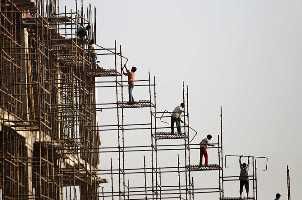The National Democratic Alliance took charge only in late May, so the revival essentially started on auto-pilot, rues Devangshu Datta.
 The prime minister’s trip to Japan will count as a carefully-orchestrated triumph for Indian diplomacy.
The prime minister’s trip to Japan will count as a carefully-orchestrated triumph for Indian diplomacy.
The Japanese committed to the equivalent of $35 billion of investments into India over the next five years, and made encouraging noises about “co-prosperity”, a term with rather unpleasant connotations for students of World War II.
The “Special Strategic Global Partnership” between India and Japan is driven by one hope: Asia’s second- and third-largest economy may develop sufficient synergy to counter-balance the gigantic number one.
India has a large, young, energetic and extremely under-skilled workforce.
It is capital-starved and the infrastructure is, to put it mildly, lacking.
Japan has pots of money and an ageing population. Japan’s zaibatsu -- its great industrial houses -- have demonstrably fabulous skills in electronics, light and heavy engineering, and across sundry infrastructure domains.
By and large, Japanese investments into India have done well and so, it does look a good fit.
That ¥3 trillion of investment will be a shot in the arm.
It depends on when, where and how it comes, of course.
But it should ensure that gross domestic product growth momentum is sustained.
The GDP numbers for April-June 2014 do suggest that, while the economy is pulling out of recession, it is nowhere near acche din yet.
There was an upside surprise with GDP growth rising to 5.7 per cent.
One would have to 'deseasonalise' for election spending, and adjust for the low base of April-June 2013.
Nevertheless, this was the best quarterly performance in over two years.
The National Democratic Alliance took charge only in late May, so the revival essentially started on auto-pilot.
Some data are puzzling or inconsistent. One key indicator, automobile sales, was up and down.
In April-June, overall unit sales grew just 1.5 per cent.
Sales picked up a little more in July and August.
Commercial vehicle sales were negative through April-July.
But Maruti did very well and two-wheeler growth was decent.
This may indicate that consumer sentiment is improving but businesses are still cautious.
The HSBC Purchasing Managers’ Index also showed that expansion continued but slowed.
The Services PMI was barely above 50 in August (below 50 is contraction).
But it has stayed above 50 since May 2014.
That is a good signal since it was continuously below 50 between July 2013-April 2014.
The Manufacturing PMI has stayed positive for the past 10 months since November 2013.
These inconsistencies gel with the Index of Industrial Production, which showed uneven and modest expansion across segments between April-June.
The next major domestic trigger could be some action on the disinvestment front but domestic investor sentiment is also mixed. Retail sentiment is good.
It translated into strong net inflows to equity mutual funds, which bought net Rs 6,000 crore (Rs 60 billion) of equity in August.
But domestic institutional sentiment has gone off the boil in September.
After being net buyers in August, domestic institutional investors have been net sellers in the first week of September.
Among other things, the endgame in Kingfisher, developments in Coalgate and generic issues with the quality of bank assets have led to caution.
This may not matter if the foreign institutional investors increase their commitments as they show signs of doing so.
FIIs bought more in the first week of September than they did in the whole of August.
This bullishness could continue.
The US, UK and emerging markets have all hit recent highs on the expectation that cheap money will continue to slosh through the global system.
The European Central Bank has cut policy rates and announced that it will be doing its own version of quantitative easing.
Balance sheet expansion by the ECB should keep the pot bubbling. Coupled to that, lower than expected US payroll expansion has made the easy-money traders even happier.
The US Federal Reserve will stick to tapering but it may not hike US policy rates for quite a while.
The traders who have gone so bullish, may, of course, be missing the woods for the trees.
The ECB is taking these easy monetary measures out of desperation because euro zone growth has stalled and the European Union may be on the edge of deflation.
The absence of bounce in US employment data is also disturbing since that means the US may not be the global engine of growth in 2014-15.
Hindi-Japani bhai bhai aside, there is no concrete evidence that Abenomics has really worked so far.
The Chinese will be happy to do 7.5 per cent GDP growth in this financial year.
Russia is seeing a spike in inflation as EU sanctions bite.
West Asia continues to be a region of flaming chaos.
So long as sentiment remains good and money is cheap, danger signals across the entire world will be ignored.
As Keynes supposedly said, markets can stay irrational for far longer than any rational investor can stay solvent.
However, if there is a tip-over into pessimism, there could be steep falls across multiple markets as traders take note of the fundamentals.
India is very likely to be a beneficiary of the optimism, so let’s hope it lasts.
The rebound in Indian GDP is certainly expected to continue and get more broad-based in nature.
Among big emerging markets (ex-China), India will probably register the best growth this year.
There will be ample investing opportunities across the corporate sector, and all the more so, if public sector bank balance sheets improve and public sector undertaking disinvestment gets off the ground.
Corporate valuations are starting to look a little rich at a Nifty PE of 21-plus (past four quarters EPS). But a strong earnings performance in Q2 could set that aright.













 © 2025
© 2025